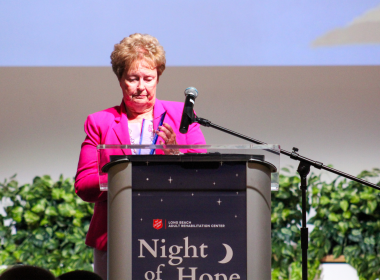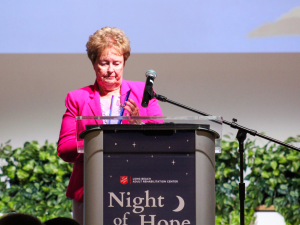Nine critical elements create transformational environments for those experiencing homelessness.
The state of homelessness in the U.S. is incredibly concerning to The Salvation Army. Consider the following statistics:
In its 2024 Annual Assessment Report, the Department of Housing and Urban Development estimated that between 2023–2024, homelessness in the U.S. increased by a staggering 18 percent, with approximately 770,000 people experiencing it during that period. This rise in the number of unhoused people can be attributed to a myriad of factors, including stagnant wages, poor access to affordable health care, lack of affordable housing and a rise in mental health and substance abuse rates.
The lack of affordable rental units, combined with 44 percent of all U.S. workers not earning a livable wage, provides clear insight into the difficulties those with low incomes face. Despite the national average hourly wage being $35.68, according to the Bureau of Labor Statistics, a far too high percentage of the unhoused make less than the average of $23 per hour to be able to afford rent. This problem is so prevalent that it is estimated that 50 percent of renters spend more than 30 percent of their income on rent and utilities.
Mental health and addiction rates are on the rise as well. In a review and meta-analysis published in JAMA Psychiatry, the current rate of mental health disorders among people experiencing homelessness is 67 percent. Despite the challenge the Substance Abuse and Mental Health Services Administration (SAMHSA) has in terms of obtaining accurate numbers on rates of substance abuse among the unhoused, it is estimated that 38 percent are dependent on alcohol, and an additional 26 percent abuse drugs.
These are heart-wrenching statistics, and one could naturally conclude The Salvation Army needs to do more. I know that is the internal pressure most large homeless service providers feel. Yet the reality is, here in the western U.S., we are doing a great deal to address the homelessness crisis.
The Salvation Army Western Territory currently has 50 emergency shelters, 59 transitional housing programs, five permanent supportive housing programs, 18 Adult Rehabilitation Centers, 13 stand-alone addiction treatment programs and 37 senior living residences. Those programs combined provide a total capacity of 14,803 beds per night. In addition, in fiscal year 2024, the territory provided over 3.8 million nights of lodging.
The Salvation Army will always respond to meet increased needs when and where it can. As our founder William Booth once said, “While women weep, as they do now, I’ll fight. While little children go hungry, as they do now, I’ll fight. While men go to prison, in and out, in and out, as they do now, I’ll fight. While there is a drunkard left, while there is a poor lost girl upon the streets, while there remains one dark soul without the light of God, I’ll fight. I’ll fight to the very end!”
Built on our strong spiritual foundation, The Salvation Army social service operation is focused on supporting, equipping, encouraging and uplifting others. It is grounded in a deep-seated belief that within every individual is incredible God-given possibility, and it is our job to create environments that help remove the barriers—mentally, physically, emotionally and spiritually—that impede others from connecting to it fully.
Scripture teaches us I can do all things through Christ who strengthens me (Phil. 4:13), and we hold that vision for others. To create these transformational environments, we must hold ourselves to the standard of creating programs of excellence.
Ensuring excellence
A “program of excellence” has as many as 10 critical elements: (1) meets an identified community need; (2) demonstrates a commitment to providing responsive spiritual care; (3) shows a dedication to infusing best practice thinking in the program design; (4) maintains a clear sense of purpose, planning and direction; (5) ensures strong administrative oversight; (6) operates with efficiency and effectiveness; (7) creates a culture of support for Salvation Army officers and staff; (8) implements strong outcomes and data collection systems; (9) shows an intentionality to grow leaders; and (10) pursues new partnerships and possibilities with vigor.
Programs of excellence create true impact on the lives of others, and when we have made that impact, it engenders a deep trust between the program participants and the organization. Developing that trust has so many tangible benefits, including opportunities to engage people in their spiritual growth and development; increased community support, engagement and recognition; and improved fundraising and staff retention.
The Salvation Army Western Territory has many programs of excellence, and they are making a tremendous difference in the lives of others. The question we must ask organizationally is how we can create more of them, and how we can effectively meet the ever-increasing needs of those we serve.
First, if there is a Salvation Army program not currently meeting that criterion of excellence (typically due to funding challenges), our systemic focus should be to train, equip, resource and support that local unit to increase its impact.
In certain rare instances, we may need to strategically abandon a program that cannot function well due to funding shortages. While we always want to advance as a social service organization, sometimes it may be better to temporarily close, regroup and examine other approaches to meeting community needs. That is not a regression. It is a commitment to always being a good steward of resources, allowing us the opportunity to reposition and reinvigorate a local operation.
The Western Territorial Social Services Department has gone through a restructuring process in the past year to increase support to Divisional Social Service Departments as they help local programs pursue and achieve programmatic excellence.
Our new Director of Research and Development will help keep the organization on top of the latest best practice research to strengthen existing program models and help foster innovation with the introduction of new program models that fit our mission.
Our new Director of Operations will help improve the efficiency and effectiveness of local operations through operational scans and the development and execution of well-written policies and procedures. The Director of Quality Assurance will spearhead the launch of a new Territorial Program Evaluation Process, ensuring that all programs meet our National Social Service Standards.
Finally, our new Director of Training and Development will help create impactful training and onboarding processes and a robust on-demand learning environment.
We are excited to boldly take on the challenges of supporting such a diverse and comprehensive social services operation across the West.
I see such strength in our officers and employees, and so many examples of impactful social service ministry. We will meet the ever-increasing needs in our communities by being faithful, working hard, collaborating internally and externally, fostering innovation and providing dedicated support to those on the front lines who are doing God’s meaningful work.
Do Good:












